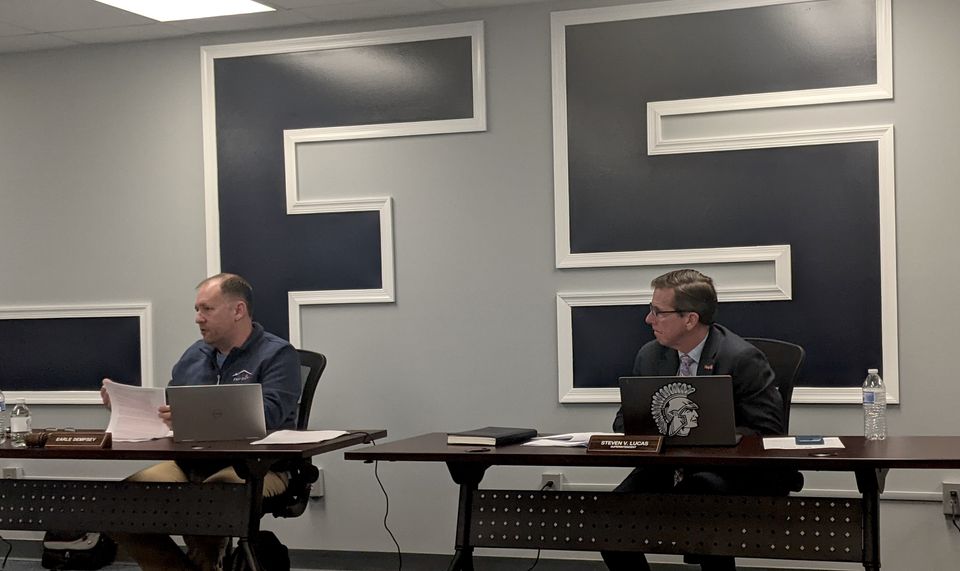How should grading work? Lake Forest weighs changes

The idea of getting rid of a “0” score for assignments met with skepticism at the Lake Forest School Board’s last meeting. Board members were more open to the idea of changing the grading scale.
The board has been working its way through a regular review of district policy, and the different sections often don’t spark much comment aside from a suggested comma here or new paragraph there. But the grading change suggestions led to a longer discussion Thursday night.
“You're not going to see too many proposed changes on the grading policy. But what you do see are going to be major changes,” James Dick, chief academic officer for the district, told the board.
The committee reviewing policy suggested two changes that fall under the “major” category. One is to amend the grading scale to match what other districts are doing. Board members seemed to be in favor of that change. The other was to make the minimum score 50, instead of 0, whether a student does any work on an assignment or not.
As far as the scale, these are Lake Forest’s current letter grades:
- A: 92-100
- B: 83-91
- C: 76-82
- D: 70-75
- F: Below 70
Almost all the other districts, Dick said, use a 10 point scale, where 90-100 is an A, 80-89 is a B, and so on. The only other exceptions are Polytech and Caesar Rodney, Dick said. The new F at Lake would be any grade 60 or lower, a 10-point swing from the current scale.
“What I don’t want anybody to think is we’re lowering our standards or lowering the bar,” Dick said.
He gave a number of reasons for this change, including competitiveness for scholarships and awards. He pointed out that when grades get translated to GPA, someone at Milford with a 90 gets a 4.0, while someone at Lake gets a 3.0.
Dick also said the change might motivate students to try higher-level courses, and increase the chances of graduation, citing research showing that if students fail enough classes they drop out. And, he said, it would have positive effects on student self-esteem.
“I'll use a football analogy,” Dick said. “Lake Forest is playing on a 120, 130 yard field and everybody else is playing on a hundred-yard field.”
The other proposal, which board members were markedly less enthusiastic about, was the minimum score of 50.
The reasoning for that minimum is that grades are supposed to indicate mastery of the material, and that giving, say, a consistently B level student a zero tanks that student’s grade for a long time and gives a warped reflection of the student’s actual level of learning.
The system of grading with both letters and numbers complicates things. For example, other grades, D to A, span roughly 10 point range, while a grade of 0 spans more than 50 points, even though it’s conceptually just below a D. Thus, an F grade can actually lower the student’s grade much more than the others.
To put it in more mathematical terms, number grades are determined by an average of the scores. Giving a student a zero introduces a big outlier that drags down the average for a long time, even if the student does fairly well afterward. It’s like giving a super F (or, what on a 10 point scale would be a “K”). As previously noted, the policy committee is recommending making 50 the lowest F possible, but still a failing grade.
Dick played a video for the board explaining the reasoning, which you can watch here.
Lake Forest already sets 50 as a minimum quarterly grade.
Lake’s grading system also currently focuses on knowledge rather than behavior. The policy reads, “Behavior, effort, and attitude will not be factored into grades.” (Dick noted, however, that effort is important.)
“I know there’s pushback that comes with this, in that you’re rewarding kids for not doing work by giving them a 50,” Dick said. “...That’s the common theme that comes from the pushback.” But, he said, “When we’re giving the zero, I would argue, and the policy committee would argue, that we’re actually grading behavior and effort at that point … so where that 50 comes in, is, we're still reporting that the kid did not master the standards. But we're not penalizing them any further and making the hole impossible to dig out of.”
There was in fact pushback from the board. Board member James Rau said he thought Lake should put its grading system in line with other districts to be fair to students, but he was skeptical of a new 50 minimum score.
“If no effort is given, why should someone get credit?” he said. He saw the logic of not giving a zero to an otherwise consistent student who misses one assignment, but “if the flip of that is now we are going to reward kids who are going to do nothing, I don’t know that that is something I would want to do.”

Dick said some teachers had concerns about it too, and he had a difficult time at first wrapping his head around the concept. But, he said, the current grading system is “not going to give a realistic picture, I think of what that (grade) should be or what a kid should know. So what it comes down to is basically, we're trying to remedy a flawed mathematical system.”
Superintendent Steven Lucas said he supports the 50 minimum as a policy that’s best for most students. There are always going to be students, he said, who try to circumvent the system to get the bare minimum score. But evidence does not show that using the zero grade as a hammer is motivating those children to do the work.
Rau said he was not in favor of such a seismic shift to grading, and wondered if there would be a way to just give some students a break on one bad score instead.
Other board members who weighed in seemed to feel the same way, including Sarah Starkey, who expressed concern about keeping up standards.
“I guess I think about college. They don't have that 50-point floor. So these children who are going to college, are we setting them up for failure beyond high school?”
The minimum of 50 is not a new question in education. For example, in a 2016 article, Education Week noted it was part of an “increasing trend to rethink grading practices” and said schools in the D.C. metro area were adopting the “no zero” policy. The article also noted similar concerns to those raised in Thursday’s board meeting over student accountability and readiness.
In the end, the board sent the proposal back to the policy committee for revision and further discussion at a later meeting.
More stories:



